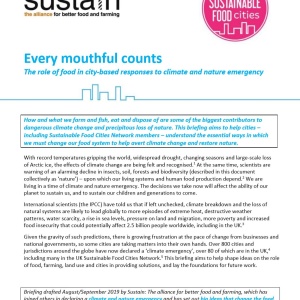
This report from UK NGO alliance Sustain aims to help policymakers at the city level understand the role of food, farming and land use in policies designed to respond to climate change and protect nature.
The top priorities for action identified by the report are:
- Formally declare both a climate and a nature emergency, to provide a guiding principle for cities to develop integrated policies.
- Increase the market for healthy, sustainably-produced food through food service institutions serving more food from farmers that use regenerative or agroecological principles, less meat and dairy, higher welfare animal products, more food of plant origin, less highly processed food and more fairly traded food.
- Design out food waste by adopting menus that use seasonal gluts of fresh produce, fruit and vegetables that are not cosmetically perfect, cuts of meat that are less widely used (to make use of entire carcasses) and fish species that are less commonly used (to relieve pressure on over-fished species).
- Adopt land-use strategies that encourage new entrants into agroecological farming, support innovative land uses that meet several needs at once (e.g. climate mitigation, food production and nature protection), and make land available for community food production (e.g. allotments for individuals or groups).
Read the full report, Every Mouthful Counts: The role of food in city-based responses to climate and nature emergency, here. See also the Foodsource chapter How can we reduce food-related greenhouse gas emissions?







Post a new comment »